Every Tesla, like any electric vehicle, needs consistent recharging. There are many reasons why it is more convenient to use an extension cord for your electric car. This means that to use an extension cord safely, you will need to get good cables. This allows you to reliably connect your vehicle to the Tesla charger.
A NEMA 5-15, 14-50 or J1772 extension cord, they can both provide the extra length you need.
- For Level-1 and 5-15 plug-in chargers, you’ll find a heavy duty extension cord.
- For plug-in Level-2 chargers such as Tesla UMC or ChargePoint Flex, here we’ve prepared a comparison of the best NEMA 14-50 extension cords.
- For the non-Tesla, next you will discover the top J1772 extenders.
- For Tesla Wall Connector or TMC find a Tesla extension cord.
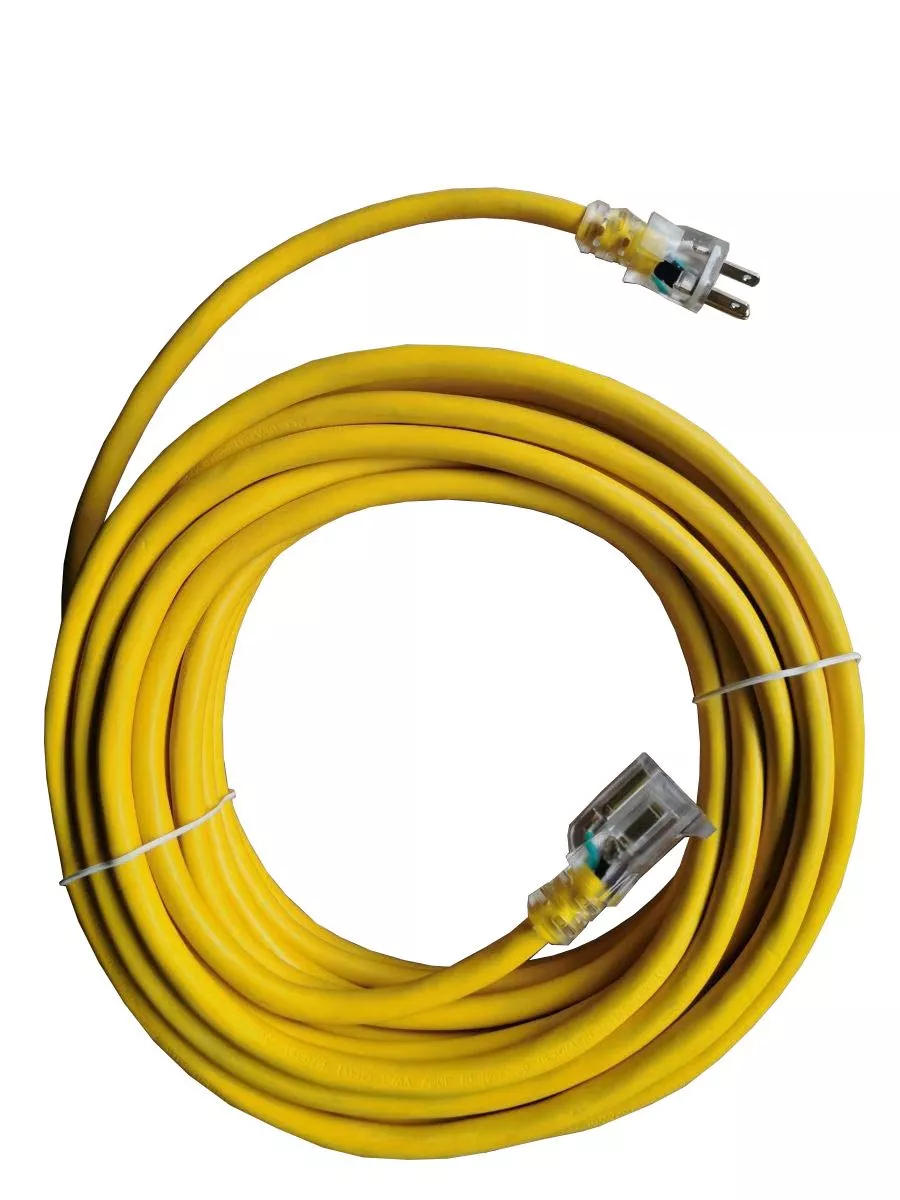
The portable charger that comes with your electric car (purchased in North America) has a NEMA 5-15 connector, which is the most common household outlet. This connection is limited to 15 amps, and not a high charging rate, which will add about 3 miles of range to your electric car per hour of charging.
The recommendations of a portable charger, whether the Tesla Mobile Connector Gen 3 or any other, draw the user’s attention to the dangers of using an extension cord. This is absolutely true, as often the cables chosen do not match the power of the charger and its long, uninterrupted runtime.
If you decide to use an extension cord, we strongly recommend that you take no chances and choose a cable with a 10 AWG (gauge) and marked SJTW. This, among others, is the safest cable characteristic that can withstand the loads for a 5-15 socket. These are the models you’ll see in our review.
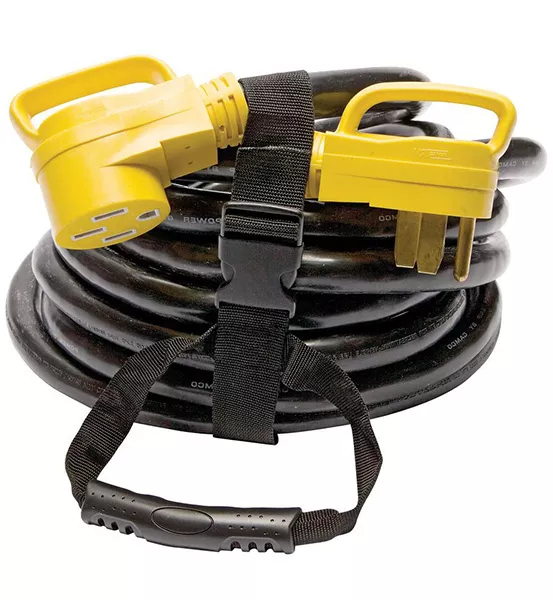
If you have a NEMA 14-50 outlet (the kind of outlet your dryer plugs into, for example), it can add about 23 miles per hour to your electric car, not 3 miles per hour anymore. A portable charger or Tesla Mobile Connector with a purchased 14-50 adapter can be used for this purpose.
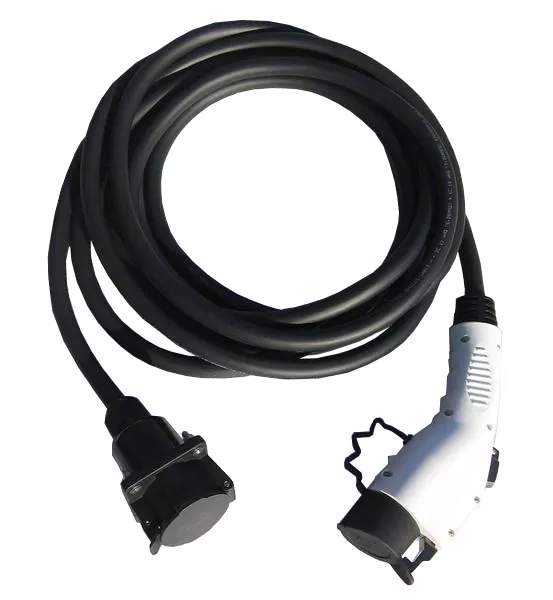
From our experience, the safest and most moisture-proof extension cable between the charger and the electric car’s inlet is considered the safest. There are no extensions like this with Tesla connectors, unlike the J1772 connector. That said, some Tesla users also use this kind of an extension cord because it is available with adapters of different directions.
Making an extension cable purchase is, for most users, just a functional thing and most don’t want to spend too much time pondering and analyzing this decision. If you are new to electric vehicles, then some terms may be new to you. Just like diesel and gas, electric vehicles have many different methods of getting the same job done.
It has to be the right caliber and length to charge your car without any problems. The Tesla charger extension cord is a 14-gauge wire. It can be used both at home and on the road.
Best 10-gauge extension cords for regular outlets
- Get a great dealMar 3, 2026 10:15 PM
- Get a great dealMar 3, 2026 10:15 PM
- Get a great dealMar 3, 2026 10:15 PM
- Get a great dealMar 3, 2026 10:15 PM
We have chosen a handful of models from the AWG 10 range of extension cord models. The Coleman extension cord is made from vinyl braid. It is moderately flexible but durable and can be used outdoors. The Coleman 50-foot extension cord is very popular among EV Adept customers. When used with TWC and a 12amp load, the cable did not heat up.
Flexzilla c potentized multilayer braid construction is a great choice for flexible cables. It can hold up to daily use. Our team was quite surprised to see the 100-foot glow-in-the dark cable. The glow-in-the dark feature will make it easier to use and prevent you from stumbling around in the garage at night.
Some other models, such as the Yellow Jacket and Iron Forge, have held up to the competition and can be used for charging an electric car without an outlet. There are several length options available that will allow you to reach up to 200 feet from an outlet.
Charging your Tesla can be a challenge when the outlet is out of reach of the charging adapter.
This can happen when traveling on a less-traveled route away from urban areas where we can use Superchargers, or even at home if the outlet is far from the garage or regular parking spot.
When taking a Tesla to a campsite, you can use many residential RV outlets to charge the car because they provide the amount of power needed. But again, you need to be close enough to it to be able to plug in a mobile charger, and that’s not always possible.
When choosing the best NEMA 14-50 extension cord, what matters to us is
- Technical specs
- Length
- Handle comfort
- LED power indicator
- Brand
- Certification
Charging cable extenders can give you an extended cable length of up to 50 feet, so you can reach outlets up to 70 feet away from your Tesla. The J1772 adapter comes with the Tesla, so you can use this type of extension cord easily.
Common plug types

The common term that all of the above connectors fall under is “EVSE”, or electric vehicle supply equipment.
Today we will be focusing on the NEMA 14-50 and J1772 connector types because these are the only plug types that allow using extension cables.
NEMA OR J1772. Which extension cord is the best?
When comparing the two options, keep in mind the following four criteria:
- Safety – is the product subjected to the elements and used in areas where people are often present?
- Technical requirements – does it fit your needs or other appliances?
- Portability – how often do you need to coil and uncoil the cord? How often do you need to store it?
- Aesthetics – does the design matter? All of the above products vary in color and design
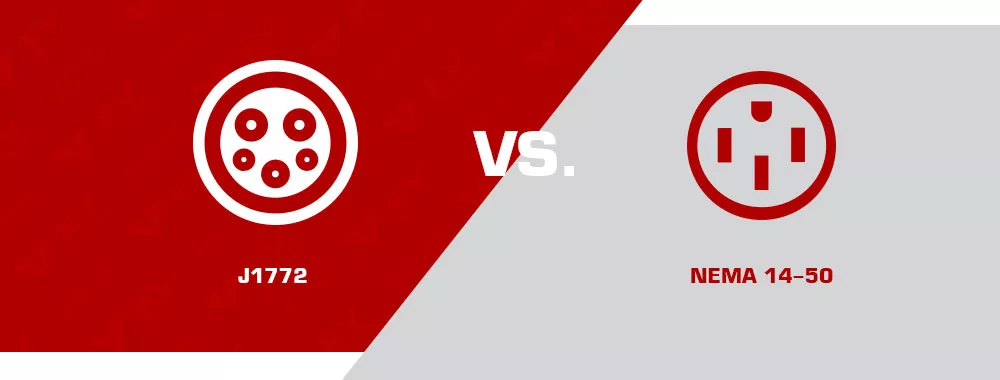
Comparison of NEMA 14-50 vs J1772 standard
| NEMA 14-50 extension cable | J1772 extension cable | |
|---|---|---|
| Application | Universal | Specifically designed for EV charging |
| Price | Lower | Higher |
| Max Current for the standard | 50A | 80A |
| Nr. of pins | 4 (hot, hot, ground, neutral) | 5 (hot, neutral, ground, proximity sensor and control pilot) |
| Overheating protection | No | Yes |
| Weight | Lighter | Heavier |
| Notes | Should be preferred for light-duty applications or if charging occurs infrequently. | A more proper solution is that the cables are sturdier and have more safety features, like overcurrent, overheat, and overvoltage protection. |
Let’s put it this way—a steak can be cut with any knife, but using a dedicated steak knife feels better and smoother. NEMA is the generic knife in this example. It is a universal option with a lower price, lighter weight, and this makes it also more portable. J1772 is specifically designed for EV charging. This makes it more convenient to plug in and unplug, a heavier but much safer option.
Charging with NEMA cable is considered safe, but why take chances when a more proper and safer option is out there?
NEMA standard is great but still inferior to J1772
Electrical code requires NEMA 14-50 to be installed with a ground fault circuit interceptor (GFCI). All modern cars are already equipped with a GFCI breaker, and two of those in consection tend to trip each other. This makes NEMA a bit of a less reliable option. It can be frustrating when you’ve charged your car before a long trip just to find out that the charging session has stopped in the middle.
The NEMA 14-50 outlet quality depends on your electrician. Cheaper outlets have been known to melt after a few months of continuous EV charging. It is understandable, since NEMA connectors are often used in short windows. Your oven or RV may pull max power for a while, but EV charging pulls maximum amps continuously.
J1772 can deliver more power. Even if your EV is not able to accept all that extra power, then most likely some of your visitors may appreciate it, and your next EV is likely to come with a more powerful onboard charger.
We recommend a dedicated wallbox style charger. Even Tesla does not offer a charger with a NEMA connector as standard anymore. That is their way of politely saying that people should opt for a wall-mounted charger.
NEMA is an excellent fit for some cases
If you own a condominium, then installing a proper Level 2 charger could be tricky since you probably need the green light from the HOA. With NEMA 14-50 outlet, it may be much easier.
J1772 is a more prevalent extension cord for an EV enthusiast
If you are an EV enthusiast, no other solution should be considered. You know you will be charging your car frequently and you want a proper solution.
Most EVs come with a dedicated charging adaptor that may or may not support the NEMA connector. Choosing J1772 means that you also have a wallbox type charger. This means that you can keep the charging adapter in your trunk for emergencies.
If you know that you are not going back to ICE vehicles, then why not choose a better solution today?
| Keep it in sight and protect it |
J1772 extension cables
If you have already decided to go with J1772 cable, then the only criteria left to choose from are length, materials, portability, resistance to elements, and design.
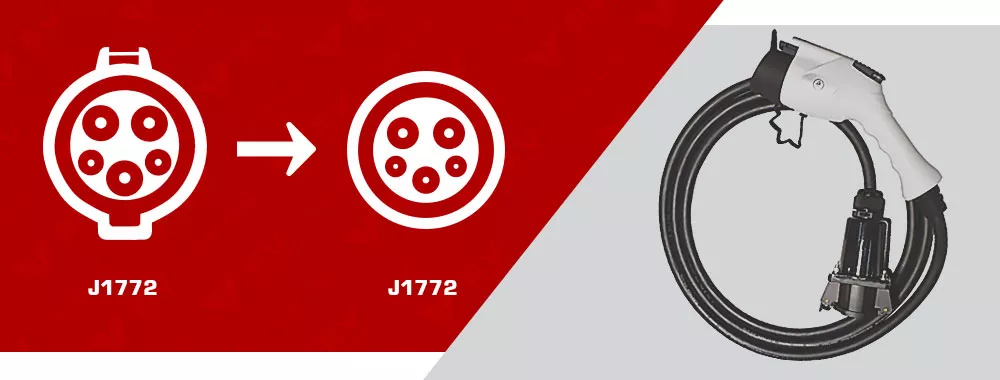
| Image | Product | |
|---|---|---|
Best Choice  | Lectron 40ft/12m J1772 Extension Cable
| Check Price READ OUR REVIEW |
Also Great 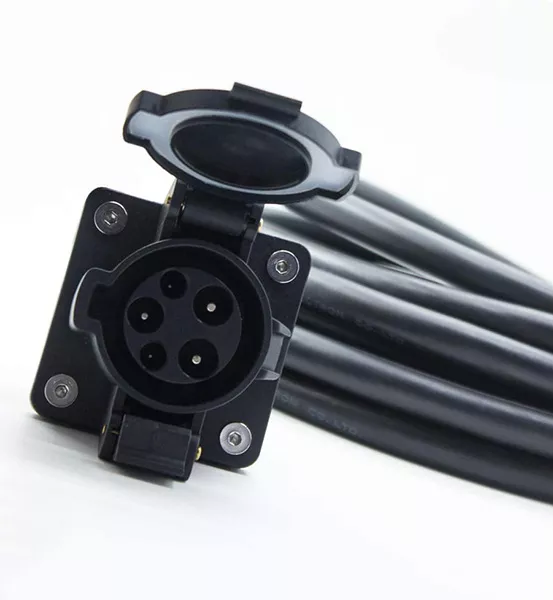 | MUSTART 40 Amp 20 Ft J1772 Extension Cord
| Out of stock READ OUR REVIEW |
Also Great 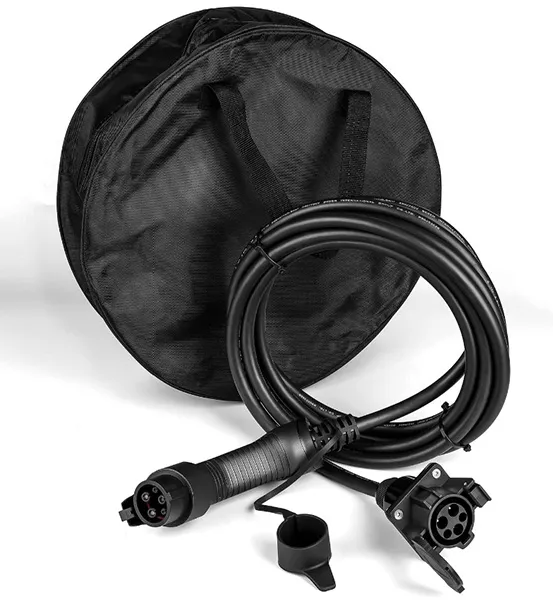 | LEFANEV 40A 20 Feet EV Charger Extension Cord
| Check Price READ OUR REVIEW |
Comparison of the J1772 extension cables
| LECTRON | MUSTART | LEFANEV | |
|---|---|---|---|
| Length options | 40ft | 25ft | 20ft |
| Conductivity | Best | Satisfactory | Satisfactory |
| Materials | Copper, high strength ABS plastic, silver plating on inlets | Copper, PVC | Copper, PVC |
| Warranty | 3 months | 2 years | Contact seller |
| Weight | 17.46 pounds | 9.9 pounds | 5.5 pounds |
| Max power rating | 40 Amps | 40 Amps | 32 Amps |
| IP rating | IP66 | IP67 | IP66 |
| Water resistance | Good | Best | Good |
All of the products above offer great safety, so choosing a product with a compelling design is also not a bad idea. Yes, the materials, durability, and weight do also vary, but since most users will use these electric car extension cords as a stationary solution, it does not matter much.
Product #1. BEST CHOICE. Lectron 40ft/12m J1772 Extension Cable Compatible with All J1772 EV Chargers
The Lectron J1772 extension cable should be your choice if you don’t feel like researching too many options for your extension cable needs. It is the most reasonably priced cable with a few features that even more expensive models don’t offer.
The plug, cable, and connections are more on the heavy-duty side. This might be the most important feature since the cable will be laying on the ground for most cases.
The silver plating in inlet provides great conductivity. With longer cables, you can expect a slight voltage drop. Similar to how water pressure in long pipes decreases due to friction. It’s the same thing with electrical cables. Silver plating lowers the resistance and lowers the voltage drop. With long cables, every bit of conductivity helps.
With an IP66 rating against water and dirt, it is dust-tight and resistant to water jets.




Product #2. MUSTART 40 Amp 20 Ft J1772 Extension Cord for EV Charger Electric Vehicle Charging Stations (Updated Version)
This extension cord should be preferred if used in locations where it is exposed to the elements or needs to be carried around. Out of the top three cables we reviewed, it was the only one with a portable bag.
It has a slightly higher water resistance level. By just looking at the IP standard, it states that the IP67 level products are dust-tight and can be submerged into 1m of water for up to 30 minutes. This should not be taken too seriously, since the standard covers clean, freshwater with no movement. In real life, water is rarely pure and moving water can still leak in.
Out of the three, it scores highest in the design category, but the cable itself does not feel that durable. At the same time, when not subjected to heavy wear, this extension cord should work wonderfully.




Product #3: LEFANEV 32A 20 Feet EV Charger Extension Cord for J1772 Electric Vehicle Charging Stations
With a length of 20ft, it is also shorter and, therefore, a lighter cable. Colored connectors or cables serve an important function since the extension cable is usually used in places where you would not expect to find a charging cable lying around. At the same time, you’ll appreciate the clean look.
It is the lightest of the three. If a portable bag were to be included, it would be the most convenient cable extension out there. If you do choose to carry it around a lot, then a “figure 8 parachute fold” method does the job without any straps and bags.
This EV cable extender should be preferred when low weight and clean look is preferred. Other than that, the features are very similar to every other product in the market.
This cable covers all J1772 standards. At the same time, no extra steps have been made by the manufacturer to make it more user-friendly. The cable itself feels like it would not like an occasional car driving over it which can occur with extension cables.



| Use this as a temporary solution |
NEMA is the best for a quick start
When you are debating between NEMA and J1772, then it helps to consider that you can’t go wrong with either, so choosing a more budget-friendly option will still work great. Even if you end up not charging your vehicle with it often, chances are a NEMA extension cord will come in handy at home. It can be used in a variety of applications from ovens and generators to RVs.
It is priced lower and gets your EV battery charged. NEMA wall connector is simpler to install and some buildings already have it installed. If you have the connector already installed, it will be a logical solution for charging your car if you wish to avoid extra hassle.
You may appreciate the lightweight style, which makes it relatively easy to carry around or store.
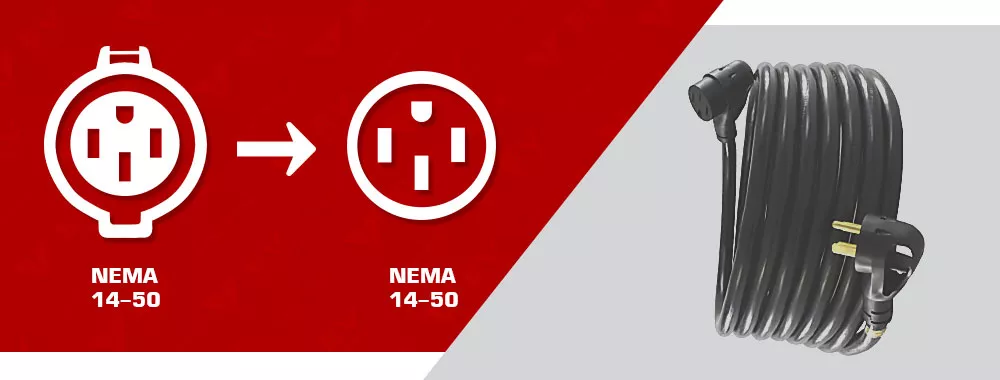
| Image | Product | |
|---|---|---|
Best Choice  | Camco 55542 30-Feet 50 AMP
| Check Price READ OUR REVIEW |
Also Great 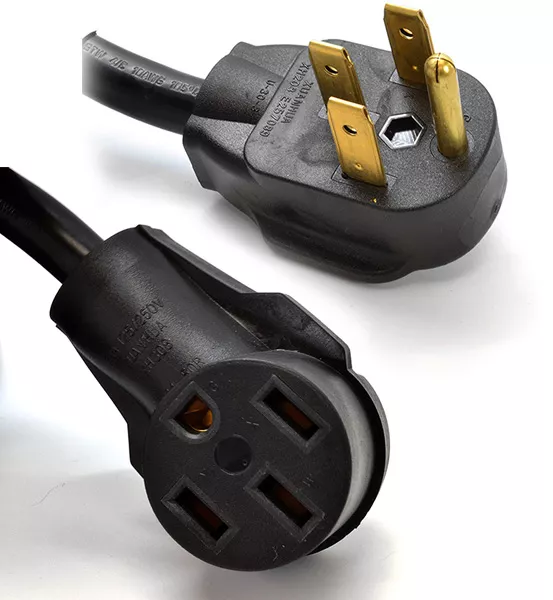 | Ceptics GN-CD-16A-50 Ft 50-Amp Auto EV Extension Cord
| Check Price READ OUR REVIEW |
Also Great 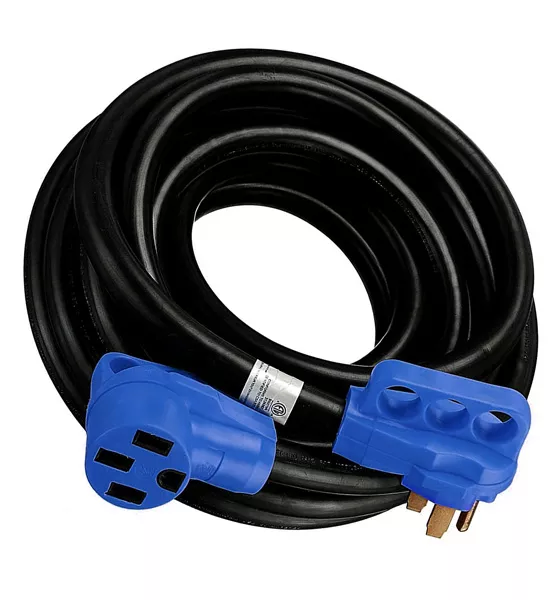 | Miady 30ft 50Amp Heavy Duty RV/EV Extension Cord
| Check Price READ OUR REVIEW |
Comparison of the Nema 14-50 extension cables
| Camco | Ceptics | Miady | |
|---|---|---|---|
| Length options | 25ft | 10ft, 25ft, 50ft | 30ft |
| Materials | Heavy-duty heat resistant PVC, copper | PVC, copper | PVC, Copper |
| Hot wire size | #6 gauge | #8 gauge | #6 gauge |
| Organizer or strap | Yes | No | Yes |
| Warranty | Contact seller | Limited lifetime warranty | Contact seller |
| Weight | N/A | 35.6 pounds | 21 pounds |
| Max power rating | 50 Amps | 50 Amps | 50 Amps |
Product #1. BEST CHOICE. Camco 55542 25-Feet 50 AMP Standard Male / 50 AMP Locking Electrical Adapter
A reasonably priced, simplest, and most practical NEMA 14-50 extension cable. Although it was not the most expensive cable we reviewed, it felt well-built in the hand, as though careful craftsmanship has been put into making this product.
One possible reason why it looks and feels to be better quality may be because out of the three companies reviewed, the Camco company has the longest experience in manufacturing cables like this, so they have had time to work out all sorts of kinks.
Most cables like these will be occasionally stored in the trunk of an electric vehicle or the garage, so the flexibility comes in handy when unwinding it or coiling it. The handle straps make it easy to carry around and store.






Product #2. Ceptics GN-CD-16A-50 Ft 50-Amp Auto EV Extension Cord (Recommended for Tesla Users Model 3/S/X/Y) | Nema L14-50-UL Listed-50A, 125/250V
Simple, yet sturdy. This product should be preferred for stationary application since the weather-resistant coating feels stiffer and there are no straps for carrying it around.
The cable is heavy duty and most would probably feel quite safe occasionally driving over the cable. The manufacturer produces mostly travel adapters and has started producing cables like this more recently. At the same time, they do offer a limited lifetime warranty but keep in mind that shipping the item back to the manufacturer in China could potentially cost you more than buying a new cable.
UL-listed — this is important. With the popularity of electric vehicles increasing, some startups and companies push their products to market in hopes of profiting from the trend. This could lead to rushed designs and poorly tested products. “UL-listed” means that the product has met the UL safety standards and that this has been verified by a third party.






Product #3. Miady 30ft 50Amp Heavy Duty RV/EV Extension Cord, Easy Unplug Design with Cord Organizer, 6/3+8/1 Gauge, ETL Listed
This extension cable should be chosen if the product is often stored, coiled, or carried around because the lightweight and carry strap makes it very convenient for frequent use. It is designed for RVs and less for electric vehicles. Usually, cables for electric vehicles are used more often than the ones for RVs. This shows in the design.
Compliments to the plug and socket engineers! The materials feel good and the handle is comfortable. The company sells the plug and socket separately quite successfully, so it seems like they have this part of the product well-thought-through.
Lightweight combined with a carry strap makes this extension cable one of the most comfortable cables to carry, coil, and store.
ETL Listed – provides more confidence in the quality and reliability of the product although the materials do not seem any better. The plastics used even feel a bit more on the cheap side.






| Water-resistant |
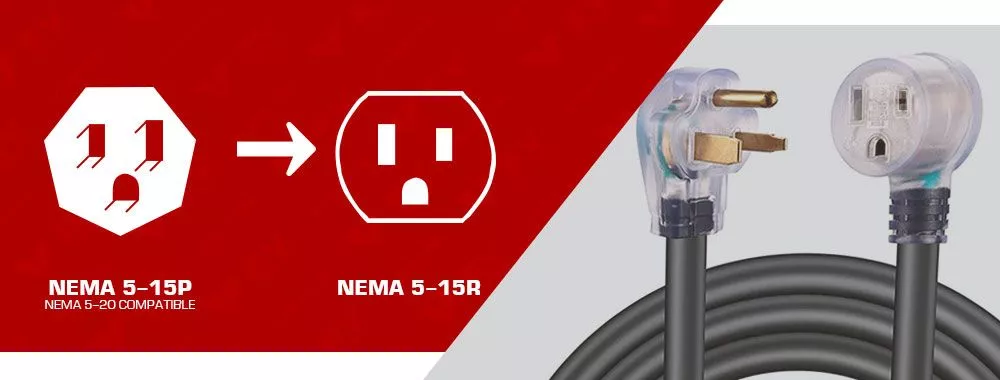
Product #1. 10 AWG Coleman / Southwire Extension Cable Review

This heavy-duty 10-gauge extension cord (NEMA 5-15) is perfect for powering large tools and appliances such as an EV charger or multiple drills, a large heater, or other high-power devices. The cord is 100 ft long and features a bright yellow vinyl jacket that resists oil, grease, moisture, and abrasion. The lighted end shows that the cord is ready to use, and the strain relief clear molded plugs help protect against damage. The Underwriters Laboratories Inc. (UL) certification means that the product has been evaluated for safety.
You may find that the power cord for your EV charger is no longer made by Coleman. It’s now manufactured and branded by Southwire, which is the parent company of Coleman. The new cable has some changes from what you’re probably used to seeing. They have improved the ground wire’s gauges, among other features. This means the current will flow more freely through all the copper wires within the insulation since they no longer share space. Product page → Coleman outdoor extension cord for EV charger.
Product #2. 10-gauge Flexzilla Pro • Most Flexible Extension Cord Review
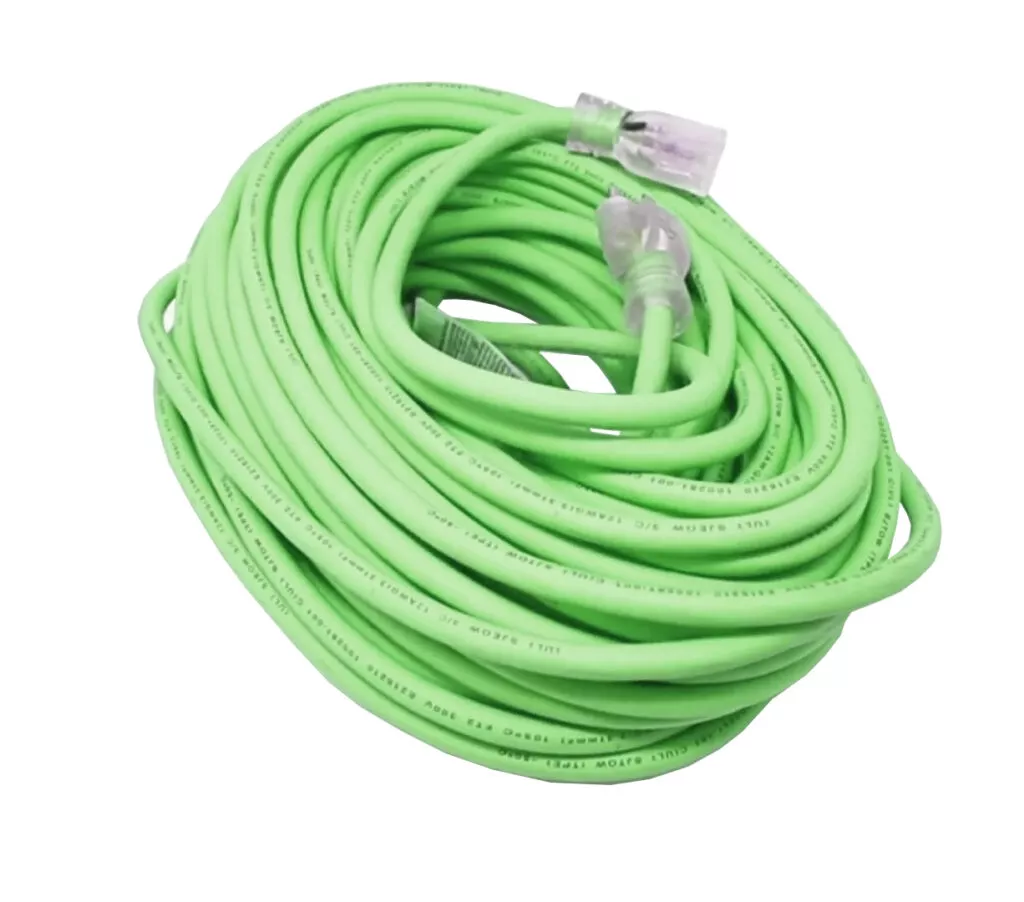
This NEMA 5-15 cord was designed to withstand the most demanding applications and features industrial-grade material. The protective thermoplastic SJTW jacket is abrasion- and corrosion-resistant and built for outdoor use. Lengths range from 25 to 100 feet.The Flexzilla Pro is a flexible, durable, and weather-resistant extension cord. This power cable features a glow-in-the-dark stripe for easy identification in low light conditions. This extension cord resists kinks and coils easily for convenient storage. It has an all-weather flexibility rating of -58°F to 140°F, so you can use it for connection with an EV charger safely in any climate or environment. Product page → Flexzilla heavy duty extension cord for EV charger
Product #3. 10 AWG Iron Forge • Multi Outlet Extension Cord Review

Iron Forge is proud to offer our high-quality, multi-use extension cords (NEMA 5-15). This heavy-duty 15-amp 125-volt 1875-watt cord can be used for a variety of applications including: electric vehicle chargers, lighting, power tools, appliances, and more. It features a grounded 3-prong plug on one end and a 5-15P/R outlet on the other end. The durable vinyl jacket resists moisture and abrasion while the built-in strain relief protects against damage from repetitive flexing.
With 3 outlets in 1, this cord is perfect for powering any household appliance—from your air conditioner to your lawn mower. The water-resistant, flexible vinyl covering protects the cords against moisture, abrasion, and sunlight, making it ideal for use in any environment.
Iron Forge’s Extension Cord has reinforced plates that protect the prongs from bending or breaking and a slip-resistant design. The cord is also temperature-resistant, with a lifetime replacement warranty. Product page → Iron Forge extension cable for Tesla charger
Product #4. Yellow Jacket 10/3 • High-load Extension Cable Review
The Yellow Jacket 10/3 100-ft heavy-duty extension cord (NEMA 5-15/5-20) is recommended for use with heavy-duty equipment and tools such as a Level-1 electric vehicle charger. This 3-prong extension cord is durable thanks to its 10-gauge wire. The Yellow Jacket features a weather-resistant, high-gloss finish and resists oil, grease, moisture, and abrasion, making this extension cord tangle-free. Total power outlets:1; Cord Length (Feet):100; Color:Black; NEMA direction: 5-15P to 5-15R.
This contractor-approved extension cord is a must-have for any job site. The lighted end shows that the cord is live and ready to use, while the heavy-duty strain relief plugs help to keep the cord in good condition for longer. This UL- and CUL-listed cord is powerful enough to handle up to 20 amps of power, making it perfect for big jobs. Product page → Yellow Jacket extension cord for Tesla Mobile Connector.
Product #5. LifeSupplyUSA • Long length Extension Cable Review
The thermoplastic SJTW jacket is abrasion- and corrosion-resistant and designed for use in the elements. There is no range of length, just one maximum length of 200 feet. The Extension Cord 10/3 SJTW with lighted end is perfect for both indoor and outdoor EVSEs. The heavy-duty protection makes it resistant to oil, grease, moisture and abrasion, while the rugged vinyl jacket ensures durability. It’s also highly flexible, making it perfect for extreme temperatures.
Compared to other shorter cords, it has a lower number of allowable amps, but this is due to the maximum possible length. When using it with the charger, you should set the electric car to consume 10 amps to avoid overheating.
This 200-ft. extension cord is perfect for use with not just EV chargers but also power tools, appliances, and more. The lighted end indicates when the power is on, and the bright PVC jacket color makes it easily visible. It’s 10 amps, 125 volts, and 1250 watts, making it perfect for heavy-duty use. Product page → LifeSupplyUSA longest 10-awg extension cord
Tesla-to-Tesla extension cord
There are times when you need to connect to a neighboring charging station in a public parking lot. Also for hardwired Wall Connector owners, this product is the only way to extend the power cable. If you own an HPWC gen 3 where the cable is too short, you know the pain of having to charge a guest’s electric car.
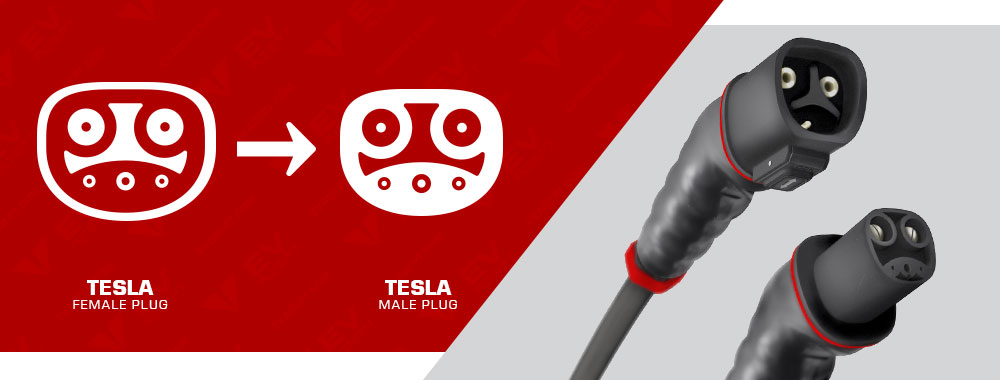
This cable is still not easy to find in stores, because of the strong requirements to the high voltage load. Prototypes are sold in small batches through authorized charger installers.
Tesla Extension Cord 20ft Review
The Tesla Extension Cord from Lectron features a 48A maximum, so you can be sure that it’s strong enough to handle the demands of your Tesla. Plus, it’s designed to stay cool, even when it’s in use—the temperature of the cable never increases. The EV Adept team tested it with the Tesla Wall Connector gen3, and the results were impressive.
The inlet holds firmly in the Tesla Model 3, and the material feels strong and solid. You can trust it to do its job every time. It’s strong, reliable and secure, and provides a great connection every time. Plus, it’s designed to stay cool, even when in use.
The flexibility of the cable is slightly less than the original TWC gen3 cable, but this should not be an issue for most users. Otherwise this 20-foot cable is much lighter than the short 14-foot cable [currently unavailable] designed for the Supercharger and can easily be transported from one location to another.
However, there are a couple of drawbacks to be aware of. Firstly, the port cover does not open when bringing the far connector to the EV’s inlet. This means that you will need to plug and unplug the extension cord manually, which could be inconvenient. The open button is also the button to stop charging, so not having it makes it less convenient to use. Of course, without this button on the handle, you can stop charging via your Tesla’s dashboard or the mobile app.
The second disadvantage is that the cable is not foolproof and can be mistakenly used on the SC. This is a safety concern and should be taken seriously.
Finally, the cable cannot be used with 80A TWC gen2. This can be a problem for those who need to charge faster or are running multiple vehicles.
Overall, the Tesla Extension Cord from Lectron is a decent choice for those looking for an extra bit of length. It has some drawbacks but, overall, it should be able to handle most charging needs. Sometimes there are discounts on the extension cord, check the product page.
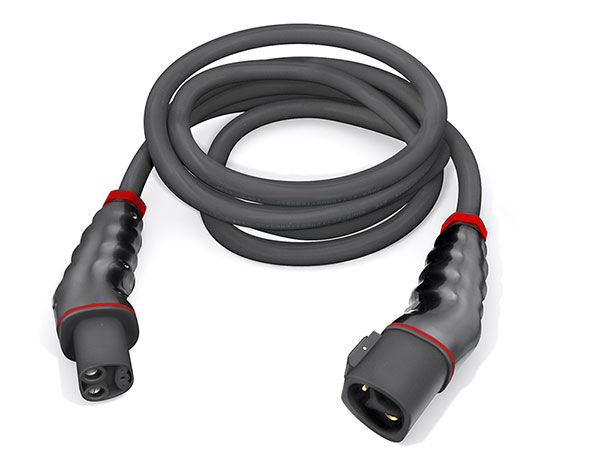
With silver-plated inlets, it provides good conductivity to prevent overheating, and has a minimum voltage drop in cold weather. Features all pins that are machine crimped for better connection. Plus, the ergonomic handles are machined from Ultraform for a comfortable grip.
This cord is AC/DC compatible. No heating above the proprietary cable was noticed during the Supercharger test. When charging is complete, the internal unlock mechanism works, which allows you to remove the cable from the car port without the owner. This is, in our opinion, a disadvantage because the cable can be stolen.
The second disadvantage is the cable length of 14ft so compared to the J1772 cable, the first is 6ft shorter. At the same time, the short length gives the possibility to use the extension cable on Supercharger charging stations. The product can easily extend the reach of your charger, so you can charge your Tesla with ease. Product page → Tesla Supercharger Extension Cable 14ft (currently unavailable).
What is the difference between UL and ETL listing?
No difference except the body that issues the listing.
| Use proper AWG |
What do “6/3 + 8/1”-gauge wires mean?
The gauge number indicates the thickness of the cord in terms of American Wire Gauge (AWG). Common extension cords are available in 16 gauge to 10 gauge, with the higher number indicating a thinner wire and lower gauge number indicating a thicker cable.
- “6/3” marking means that there are 3 conductors with gauge #6. These are for the neutral wire and two hot wires.
- “8/1” marking means that there is one wire with gauge #8. This is for the ground and should not carry any current.
With length the resistance of the cord increases. Choosing a thicker cable enables reducing the voltage drop and the risk of overheating. Even if the cables are good, the connector could potentially overheat if the contact between the metal surfaces is not ideal. Using high-grade contractor materials like silver-plated copper helps to reduce that risk a great deal.
| Use only grounded cords |
Never remove the ground pin (the third prong) on grounded power cords, as this can create a hazardous situation where there is no recourse if someone becomes electrocuted, and it may void your EVSE guarantee.
Be sure your home is wired with sufficient grounded electrical receptacles for new items you bring into your house or apartment; always consult with an electrician if you are unsure about how many circuits are running throughout your home.
Insulation materials for extension cables
The outer jacket of an extension cable protects against high temperatures, physical stress, and chemical substances, among other hazards.
The extension cables we’ve reviewed are made of abrasion-resistant and low-adhesion PVC, PUR, or TPE that have been coated to meet the requirements of the application.
PVC (Vinyl) cable is particularly abrasion-resistant and ideal for use in lighting technology, packaging machines, and assembly lines. It is resistant to permanent moisture and salt water but not halogen-free. PVC has the best price-performance ratio in the low-voltage range. It’s not ideal for EV chargers.
PUR (Polyurethane) is a halogen-free and self-extinguishing thermoplastic elastomer. It has excellent chemical resistance, good electrical properties, low temperature flexibility and high tensile strength. Its outstanding physical properties make it the ideal material for use in machine tools, plant construction, or cement plants. It is also used to protect cables in automotive applications thanks to its abrasion and notch resistance.
With a temperature range up to 400°F (205°C), PUR is rubber-like and has low temperature flexibility, making it an ideal choice for applications where other materials would not stand up to the demands.
A TPE cable is a thermoplastic elastomer material that is commonly used for flexible cables. It can reliably withstand mechanical loads and has resistance to external influences such as chemicals and extreme temperatures. TPE is generally suitable for a temperature range of -31˚ to 212˚F. Offered as halogen-free or flame-retardant, UL 94-HB-compliant TPE cables handle harsh environmental conditions and continuous movement very well. Often found in crane applications or material handling, TPE cables are a great choice for your charging or industrial needs.
Is it safe to use these cables in the rain and snow?
Some people don’t feel safe even when washing an electric car or letting it sit in the snow or rain with a charging cable attached. Engineers in automotive companies have thought about these dangers and built-in safety features to tackle them. Every EV charger extension cord is protected with short circuit protection and residual current protection.
A short circuit occurs when a current travels along an unintended path, often where essentially no (or a very low) electrical impedance is encountered. In simple terms, the device detects unusual peaks of current and shuts the device off when such an event occurs. Usually, it means that the two hot wires somehow come into contact, and this will lead to rapid overheating if not protected with a short-circuit breaker. Events like these usually happen when the cables are damaged by a metal object.
A residual current protection device measures the current flowing through each of the wires. In normal circumstances, they are equal. If one of the wires gets damaged and starts to bleed electricity, the device cuts the power. We recommend the J1772 extension cord as a safer option.
| Use a heavy duty cord |
Does cord length affect charging speed?
Yes, but not substantially. Just like a long garden hose – every foot adds a bit to the friction and lowers the water pressure at the end of the hose. Similarly, In electrical engineering terms the resistance increases with length, this lowers the voltage (electrical pressure) and less comes out the other end.
For example, 25 feet of #8-gauge or #6-gauge wire will cause a voltage drop of about 1 percent if the supplied voltage is 120 volts and the wire carries no more than 50 amps.
How long does it take to charge an electric vehicle using an extension cord?
| 40 Amp EV charger | 32 Amp EV charger | 16 Amp EV charger | |
|---|---|---|---|
| Tesla Model 3 | 3 h 54 min | 3 h 54 min | 7 h 54 min |
| Nissan Leaf • 40 kWh | 3 h 25 min | 3 h 25 min | 6 h 39 min |
| Chevy Bolt | 5 h 47 min | 5 h 47 min | 10 h 58 min |
Another electric car? Using a calculator and make a calculation using your data.
In fact, if the cable is a typical length, the difference in resistance is negligible, and the presence of a supplement will not have a significant effect on the charging speed.
| Turn it off when not in use |
| Think about source wiring |
FAQ
What is an EV charging extension cord?
An EV charging extension cord is a cord that you can use to extend the reach of your EV’s charging cable. This can be helpful if your EV is parked in a spot that’s not near a charging station. Extension cables for connecting chargers can also connect the EVSE itself to outlets of different NEMA connectors.
What types of extension cords are there?
There are a few different types of extension cords that are compatible with EVs. The most common type is the J1772 extension cord (non-Tesla). This cord is used with Level-1 and Level-2 charging stations. The other type is the NEMA extension cables that connect the power supply and the charger. A third type of extension cable is a male-to-female cable for the Tesla (NACS) connector L1, L2, and L3.
How do I know which extension cord I need for my EV or charger?
If you’re a non-Tesla owner and using a Level-1 or Level-2 charging station, you’ll need a J1772 extension cord like this.
If you’re using a Tesla home charging station, you’ll need a Tesla extension cord like this.
If you’re a non-Tesla owner and you need to extend Level-2 charging station to a plugin connection, you’ll need NEMA extension cords: 14-50, 6-50, 6-20.
If you’re any EV owner and you need to extend Level-1 portable charger to 120-v standard wall outlet, you’ll need a heavy duty 5-15 NEMA extension cord like this.
What EV charging cable extensions are suitable for Tesla?
A NEMA 14-50 extension cord will be suitable for use with the Mobile Connector (portable charger) and plug-in Tesla Wall Connector gen 2. Extension cables are not yet available for the Tesla Wall Connector gen 3 (hardwired stationary charger). There is an option to use the J1772 extension cord, which you can read about below.
Will the J1772 extender cable fit as a Tesla extension cord?
You can use a stationary or portable charger for non-tesla vehicles at home. Each Tesla comes with an adapter for this purpose. So a non-Tesla charger + J1772 extension cord + adapter will be able to charge your Tesla.
Which extension cord should you use: a 10-gauge or a 12-gauge?
The gauge of 12GA is larger, but the difference between the two gauges is minor. 12 AWG extension cords will suffice for most devices. Lawnmowers, heavy equipment, and other power-consuming appliances require a lower gauge, such as a 10AWG. The gauge tells you how thick the cord is. Keep in mind that the lower the gauge, the thicker the wire.
What is the maximum length of an extension cord that may be used?
Extension cords should not be more than 100 feet long. Moreover, for the NEMA 14-50, you will often only find 50-foot lengths on the market. J1772 cables are usually even shorter, at 40 feet. The maximum length of an extension cord may be exceeded by adding one extension cord to another, but this is dangerous and often leads to overheating. If the work is more than 100 feet long, a temporary power distribution box is necessary for NEMA.
Can I use an extension cord with the Level 1 charger?
Technically, yes, and you will need a 5-15 extension cord with a maximum load to do so. As with other chargers, EVSE manufacturers do not recommend an extension cord. However, user practice says that it is possible if safety rules are followed.
Why won’t my Tesla charge through an extension cord?
The Tesla probably can’t detect a ground connection. If your outlet is serviceable, make sure you are using a 3-prong grounded outlet and your extension cord has 3 prong. We’ve prepared a list here of tested and certified cables that are specifically compatible with the Tesla Mobile Connector.
What is the AWG of the extension cord for the Tesla Wall Connector?
We recommend the 10-AWG extension cords, we’ve selected for you in this review.
How do I protect EV extension cord from theft?
Blocking the cable with an electric car is, unfortunately, easily circumvented by criminals. Using a padlock is the most secure. Put a padlock on the lid of the inlet with the cable through the shackle if you want extra security. There are other ways, such as running the wheel over the cable or pinning it down.
How much does an EV charging extension cord cost?
Reliable EV charging extension cords typically range in price from $200. The price will vary depending on the type of cord and the length. Here are the items with prices NEMA 5-15, NEMA 14-50, J1772 and Tesla.
Do I need an adapter for my EV charging extension cord?
In most cases, you won’t need an adapter for your EV charging extension cord. However, there are a few exceptions.
If you’re a non-Tesla owner and using a Tesla charger, you’ll need a Tesla to J1772 adapter.
If you’re a Tesla owner and using a charger with J1772 (ex. Chargepoint), you’ll need a J1772 to Tesla adapter.
Can I use my EV charging extension cord with any EV?
No, you can’t use your EV charging extension cord with any EV. The type of cord you need depends on the type of charging station you’re using and the type of EV you have: J1772, Tesla (NACS) or NEMA.
Can I use an EV charging extension cord with a Level-2 charging station?
Yes, you can use a J1772 or NEMA 14-50 extension cord with a Level-2 charging station. Have a look at our comparison chart.
Can I use an EV charging extension cord with a Tesla home charging station?
Yes, you can use a Tesla extension cord with a Tesla Mobile Connector, Tesla Wall Connector, and Tesla Destination chargers. Another J1772 extension cord you can also use with the J1772 to Tesla adapter for all of the above types of chargers.
Can I use an EV charging extension cord with a NEMA 14-50 connector?
Yes, you can use a NEMA 14-50 extension cord if your charger uses this type of connection.
What is a NEMA 14-50 connector?
A NEMA 14-50 connector is a type of connector that provides 50 amps (EVSE uses only 40 amps). The NEMA 14-50 is used with Level-2 charging stations. It is compatible with any EVSE that has a NEMA 14-50 connector.
How do I connect the J1772 extension cord correctly?
First connect to the charger, then to the vehicle. Sometimes it is recommended to wait 30 seconds before connecting to the electric car.
What is a NEMA 5-15 extension cord?
A NEMA 5-15 extension cord is a heavy duty cord that is commonly used to power appliances and devices. It is also commonly used to connect an EVSE (Electric Vehicle Supply Equipment) to a Level-1 charger.
What is the difference between a NEMA 5-15 and a NEMA 5-20 extension cord?
The main difference between a NEMA 5-15 and a NEMA 5-20 extension cord is the amperage rating. A NEMA 5-15 extension cord is rated for 15 amps, while a NEMA 5-20 extension cord is rated for 20 amps.
Our Top Pick
Chargers that come with the vehicle are not always long enough to reach your parking spot. If you are a Tesla owner, along with connecting the Mobile Connector to a NEMA 14-50 outlet, a Camco extension cable would be a great choice.
The best solution for that problem is the LECTRON J1772 extension cable over NEMA extension cable because it offers excellent safety features and is more weather resistant. The cons of the J1772 is a the slightly higher price and weight but is considered a more proper and safer solution because it is designed specifically for EV charging. Even when manufacturers follow the same standards, the quality, materials and workmanship vary. The best is to choose a product that is tested by a third party.
The NEMA 14-50 connector will also get the job done and is considered a reasonably safe option. When you need to charge infrequently and the cable needs to be used to power other appliances, then NEMA extension cable should be your first choice. This standard is not designed for EV charging, therefore overheating and tripping the ground fault circuit interceptor can occur.
Electricity can be dangerous. Have you ever worried about the safety of charging an electric vehicle with extension cables? It can be done wrong, and you can also buy the wrong EV extension cord that does not fit your situation. Most chargers come with a 16-foot cable, which is not long enough for many users. This article is for every EV owner who happens to have their electrical outlet or a charger farther away than ideal. Here you can find all the info you need to get the purchase right extension the first time.
Contents
- 1 Best 10-gauge extension cords for regular outlets
- 2 Charging your Tesla can be a challenge when the outlet is out of reach of the charging adapter.
- 3 When choosing the best NEMA 14-50 extension cord, what matters to us is
- 4 Common plug types
- 5 NEMA OR J1772. Which extension cord is the best?
- 6 Comparison of NEMA 14-50 vs J1772 standard
- 7 NEMA standard is great but still inferior to J1772
- 8 NEMA is an excellent fit for some cases
- 9 J1772 is a more prevalent extension cord for an EV enthusiast
- 10 J1772 extension cables
- 11 Product #1. BEST CHOICE. Lectron 40ft/12m J1772 Extension Cable Compatible with All J1772 EV Chargers
- 12 Product #2. MUSTART 40 Amp 20 Ft J1772 Extension Cord for EV Charger Electric Vehicle Charging Stations (Updated Version)
- 13 Product #3: LEFANEV 32A 20 Feet EV Charger Extension Cord for J1772 Electric Vehicle Charging Stations
- 14 NEMA is the best for a quick start
- 15 Product #1. BEST CHOICE. Camco 55542 25-Feet 50 AMP Standard Male / 50 AMP Locking Electrical Adapter
- 16 Product #2. Ceptics GN-CD-16A-50 Ft 50-Amp Auto EV Extension Cord (Recommended for Tesla Users Model 3/S/X/Y) | Nema L14-50-UL Listed-50A, 125/250V
- 17 Product #3. Miady 30ft 50Amp Heavy Duty RV/EV Extension Cord, Easy Unplug Design with Cord Organizer, 6/3+8/1 Gauge, ETL Listed
- 18 Product #1. 10 AWG Coleman / Southwire Extension Cable Review
- 19 Product #2. 10-gauge Flexzilla Pro • Most Flexible Extension Cord Review
- 20 Product #3. 10 AWG Iron Forge • Multi Outlet Extension Cord Review
- 21 Product #4. Yellow Jacket 10/3 • High-load Extension Cable Review
- 22 Product #5. LifeSupplyUSA • Long length Extension Cable Review
- 23 Tesla-to-Tesla extension cord
- 24 Tesla Extension Cord 20ft Review
- 25 Tesla Extension Cord 14ft Review (currently unavailable)
- 26 What is the difference between UL and ETL listing?
- 27 What do “6/3 + 8/1”-gauge wires mean?
- 28 Insulation materials for extension cables
- 29 Is it safe to use these cables in the rain and snow?
- 30 Does cord length affect charging speed?
- 31 How long does it take to charge an electric vehicle using an extension cord?
- 32 FAQ
- 33 Our Top Pick
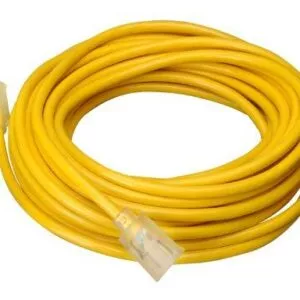
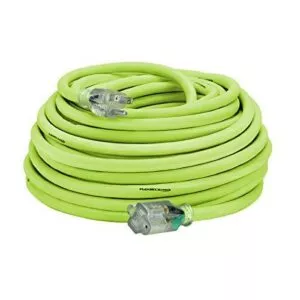
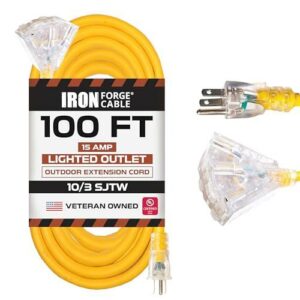
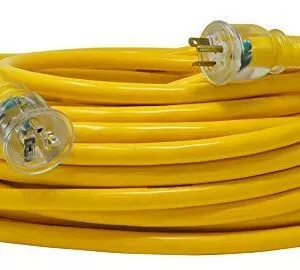
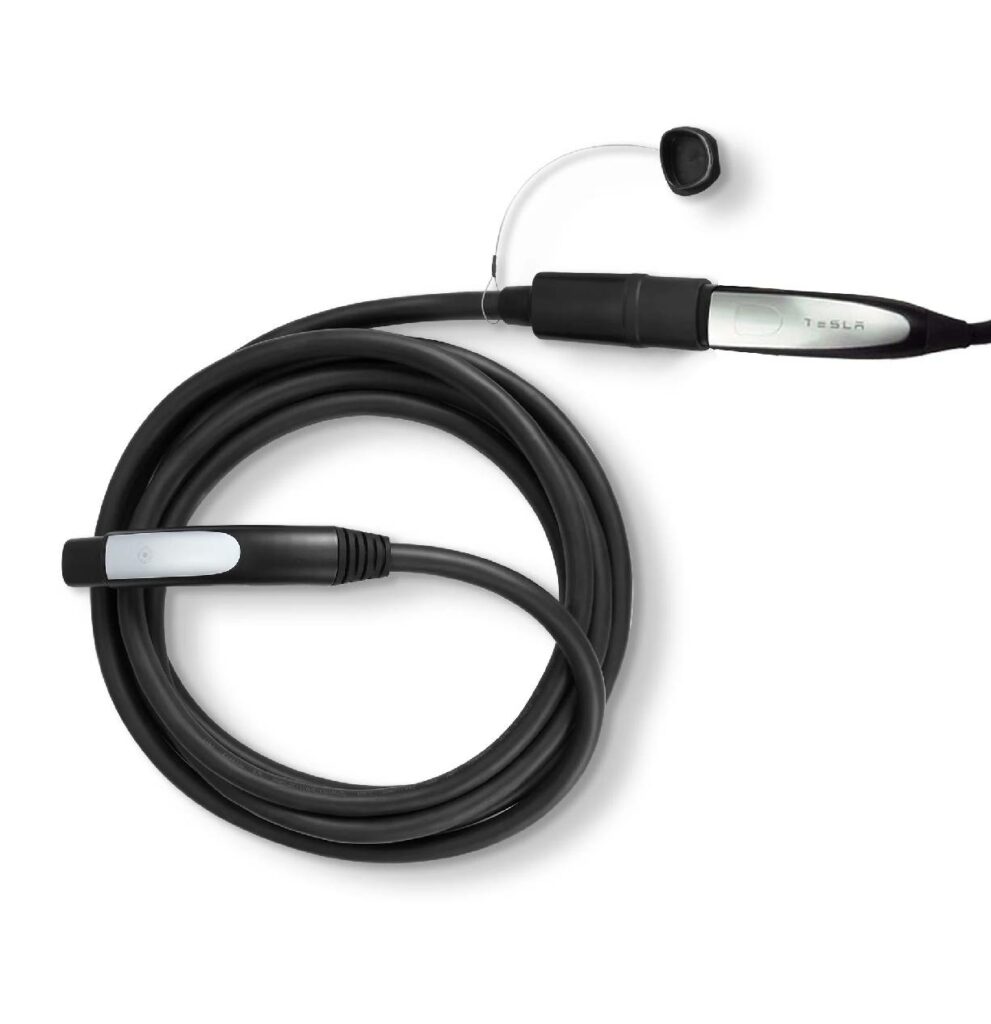

I got he gauge for the extension cords –
can you tell which gauge are the EV MOBILE CABLE* CORD CHARGER?
and the Adapters cable cords gauge?
– if I use a 14-50 nema ?
– if I use a 6-20 ?
and
– if I use a 5-15?
Great question. The cable AWG depends not only on the socket, but also on its length. The charger’s power also influences the AWG. These are our recommended models.
We appreciate your suggestion and will look into how to create a summary table with all this data.
It’s nice to know that there are also lighted plugs that can be used for EV chargers. I’d like to know more about EV charger station installation services because I’m interested in selling my car someday. Afterwards, I will be buying an electric car.
Tesla is finally doing the right thing by opening up its charging connectors to all. This move will help accelerate the shift to electric vehicles. Hopefully there will be one type of extension soon, it’s NACS.
i used an extension cord outside to charge my chevy but it rained and the charger stopped charging. is it a short circuit?
The most important thing to remember is that not all extension cords are created equal. Some are only meant for indoor use, while others are made for outdoor use. Be sure to check the rating on the extension cord before using it.
It’s perfectly fine to charge your Tesla with an extension cord! I’ve done it myself a few times and it’s never caused any problems.
I’m so glad I found this article! I was having trouble charging my Mach-E, but now I know what to do. Thank you!
I wouldn’t recommend it as a long-term solution, but it’s definitely okay to use an extension cord for a quick charge.
I’ve heard that it’s not good for the battery to charge your Tesla with an extension cord, so I would avoid it if possible.
Come on, bro. It’s a myth, it can’t affect the battery in any way!
There’s no harm in using an extension cord to charge your EV, but I would make sure it’s a heavy-duty cord that can handle the power.
this is a great article! i didn’t know that there was such a thing as an ev charging station without an extension cord!
I don’t think it’s a good idea to charge your Tesla with an extension cord because it could overheat and cause a fire.
That’s what the safety precautions and maximum power are written for here. I’ve been using it in the office parking lot for two years now and it’s okay.
I’ve never tried it myself, but I’ve heard that you can charge your Tesla with a NACS extension cord. I’m not sure if it’s safe though.
So, I would only charge my Chevy with an extension cord if I absolutely had to, but it’s definitely doable.
I just got an electric car and this article was very helpful
My extension cord gets very hot when I plug in the UMC, will this be the case with all cables?
Be aware of the maximum amperage rating on the extension cord. Most EV extension cords for a standard outlet are only rated for 10 or 15 amps. If your EV has a higher charging rate, you’ll need a heavier-duty extension cord. Such models are described in the above article in detail.
We need more companies like Tesla that are willing to take bold steps to promote the adoption of clean technologies.
I’ve been thinking about getting an electric car, and this article has convinced me to go for it!
That means the majority of EV owners are either charging their cars at home or at work, or using public charging stations. And that’s good news, because using an extension cord to charge your car is definitely not recommended.
I had no idea how to charge my Hyundai Ioniq5 either. This article is very helpful. Thank you!
Yep, I had no idea there were different types of extension cords for EVs! This is definitely something I’ll need to keep in mind when I’m shopping for one.
I always forget to bring an extension cord with me when I travel, so this article was a great reminder. Now I know to always keep one in my car so I can charge my EV no matter where I am.
I didn’t realize how important it was to have the right extension cord with me when I drive my VW id4. Now I know what to look for and I’ll be sure to keep one in my car at all times.
I recently got the Camco’s Power Grip 55195 for my Tesla. Gotta say, it’s been a game-changer. I remember the days when I’d struggle with my old cord, especially during the rainy season. The weather-resistance on this one is legit. However, it’s a bit on the pricier side. But for the durability and peace of mind, I’d say it’s worth it. Anyone else using this? Thoughts?
I’ve been hearing a lot about the Lectron J1772 Extension Cable. Is it really that much better than the NEMA ones? I mean, in terms of safety and weather resistance?
I’ve used both, and I can vouch for the Lectron J1772. It’s been holding up well during our harsh winters. Plus, the safety features are top-notch. But if you’re on a budget, the NEMA ones aren’t bad either. Just make sure you get the right rating for your charger.
For those new to EVs, here’s a quick guide on choosing the right extension cord: 1. Determine your charging level: Level 1 (120 volts) or Level 2 (240 volts). 2. Check the amperage: At least 15 amps for Level 1 and higher for Level 2. 3. Length matters: Shorter is better to reduce voltage drop, but get what suits your needs. 4. Weather resistance: Especially if you’re charging outdoors. Remember, safety first! Always go for cords designed for EVs.
Hey folks, I’m new to the EV world. Looking for an extension cord that’s not too expensive but reliable. I have a Level 2 charger. Any suggestions?
Welcome to the club! I’d recommend the NEMA 14-30 Extension Cord for Level 2. I’ve been using it for a while now, and it’s a good balance between cost and performance. Just make sure to check the length you need.
I bought a non-branded extension cord online, and it’s been giving me issues. Sometimes the charging stops midway, and I’ve noticed some wear and tear already. Lesson learned: don’t skimp on quality. Anyone else faced this?
I’ve been analyzing the Camco’s Power Grip vs. the Lectron J1772. While the former is more popular among Tesla owners, the latter seems to have better safety features. The price difference isn’t huge either. Thoughts on which one offers better value for money?
Quick tip: If you’re using an extension cord outdoors, consider getting a protective casing or cover. It’ll prolong the life of the cord and protect it from the elements. Learned this the hard way after my first cord got damaged in a storm.
Heads up! There’s a new extension cord coming out next month, specifically designed for EVs. It boasts of better durability and advanced safety features. Stay tuned for more details.
Anyone in the New York area interested in a group buy for the Lectron J1772? We can get a good discount if we order in bulk. DM me if interested.
Just read about a recall on certain non-branded extension cords sold online. They’ve been reported to cause short circuits. Please check your cords and stay safe!
Been using the Tesla Supercharger Extension Cable for a few trips now. It’s been a game-changer when the charging station is crowded or the parking spot is a bit far. The 14ft length is just right for me. Anyone else find it as handy as I do?
Totally agree. I’ve been in situations where the extra length was a lifesaver. Especially in some older charging stations where the layout isn’t as EV-friendly.
Has anyone recently bought the EVSEAdapters Supercharger Extension Cord? I’ve been searching for it, but it seems to be out of stock everywhere.
I had the same issue. Ended up going for the Tesla Extension Cord from Amazon. It’s been working well for me so far.
For those using extension cords, always ensure you roll them up properly after use. Avoid kinks and bends. I store mine in a carrying case, which also protects it from the elements. Little care goes a long way in prolonging its life.
I’m looking for an extension cord specifically designed for Tesla fast charging. Saw a YouTube review about a 20ft one, but can’t find it online. Any leads?
I think you’re talking about the one with the carrying case. I got mine from a local EV accessories store. Maybe check with local dealers?
I bought a generic extension cord, and it doesn’t seem to work well with the Supercharger. Sometimes the charging stops midway. Anyone faced this?
Generic cords can be hit or miss. I’d recommend going for one specifically designed for Tesla chargers. It might be a bit pricier, but it’s worth the peace of mind.
I’m torn between the Tesla Supercharger Extension and the EVSEAdapters one. Both seem good, but I’m leaning towards the latter for its durability. Thoughts?
Just a heads up for fellow Tesla owners: Always inspect your extension cords before use. Check for any damage or exposed wires. Safety should always be a priority.
For those looking for the EVSEAdapters Supercharger Extension, I saw it back in stock on their official website. Thought I’d share for those interested.
Anyone in the Chicago area interested in a group buy for the Tesla Supercharger Extension Cable? I’ve got a contact who can give us a discount for bulk orders.
Be cautious when buying extension cords online. Came across a counterfeit that looked legit but had major safety issues. Always buy from reputable sources.